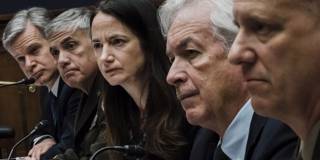The US intelligence community acquitted itself well in the lead-up to Russia’s invasion of Ukraine, previewing the aggressor’s actions and discrediting its efforts to create a pretext for war. In a conflict that is heavily shaped by information warfare, America’s spies should lean into this strategy.
ATLANTA –Last month, when US National Intelligence Director Avril Haines presented the intelligence community’s annual threat assessment to the Senate Intelligence Committee, committee members praised her for the “excellent work” leading up to Russia’s invasion of Ukraine, and for “continuing to keep us informed.” To the US intelligence community’s credit, and to Russian President Vladimir Putin’s chagrin, US senators weren’t the only ones kept informed. The rest of the world was, too, thanks to thorough strategic US intelligence disclosures.
Making intelligence public is more art than science, and spies and analysts have struggled to master it. But when it comes to Ukraine, CIA Director William Burns deserves recognition for changing how the agency thinks about revealing its secrets. A former ambassador to Moscow, Burns told the Senate committee that, “In all the years I spent as a career diplomat, I saw too many instances in which we lost information wars with the Russians.”
That experience has now paid off. For months before Putin’s invasion, the intelligence community played against type, declassifying information and analyses that previewed Russian preparations and intentions. The reports discredited ostensible provocations (“false flags”) and warned about Russia’s military build-up. Dismissed by Kyiv and Moscow at the time, the facts and forecasts hit the bull’s-eye. As Russian forces now sink deeper into a new quagmire, US intelligence agencies should lean into this strategy.

ATLANTA –Last month, when US National Intelligence Director Avril Haines presented the intelligence community’s annual threat assessment to the Senate Intelligence Committee, committee members praised her for the “excellent work” leading up to Russia’s invasion of Ukraine, and for “continuing to keep us informed.” To the US intelligence community’s credit, and to Russian President Vladimir Putin’s chagrin, US senators weren’t the only ones kept informed. The rest of the world was, too, thanks to thorough strategic US intelligence disclosures.
Making intelligence public is more art than science, and spies and analysts have struggled to master it. But when it comes to Ukraine, CIA Director William Burns deserves recognition for changing how the agency thinks about revealing its secrets. A former ambassador to Moscow, Burns told the Senate committee that, “In all the years I spent as a career diplomat, I saw too many instances in which we lost information wars with the Russians.”
That experience has now paid off. For months before Putin’s invasion, the intelligence community played against type, declassifying information and analyses that previewed Russian preparations and intentions. The reports discredited ostensible provocations (“false flags”) and warned about Russia’s military build-up. Dismissed by Kyiv and Moscow at the time, the facts and forecasts hit the bull’s-eye. As Russian forces now sink deeper into a new quagmire, US intelligence agencies should lean into this strategy.